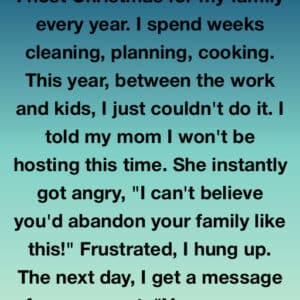ChatGPT said:
I never thought I’d say the words out loud, but there it was across my kitchen table: “Naomi, I can’t keep feeding your boys for free.”
She just shrugged. “Then don’t.”
It wasn’t the shrug that hurt. It was Matty and Eli standing behind her, quiet and small, like kids who’d stopped expecting much from the adults around them.
I’m not a wealthy woman. I work part-time at a bakery and raise my ten-year-old, Lila. Money is a careful thing in our house; we measure it out like flour—enough for what’s needed, not a grain more. Still, I’ve always believed you don’t let kids go hungry—especially not family. But I was feeding my nephews more than their mother was, and it was starting to break me.
Naomi wasn’t always like this. We grew up on canned beans and rice, promising each other our kids would never know that kind of hunger. Somewhere along the way she fell into quick fixes and a “conscious parenting” crowd that called food a vibration and hunger a mindset. The boys were “free to choose,” which meant cornflakes when there were cornflakes, and nothing when there weren’t.
One evening I found Matty, seven years old, trying to open a can of beans with a screwdriver. I sat him at the table, warmed a bowl of chicken soup, gave him half my sandwich. He ate like someone listening hard, then said, “Auntie, I think God listens to your kitchen.”
That was the night I stopped arguing. I’d asked, begged, lectured. None of it moved Naomi. So I stepped in—but on my terms.
I started doubling dinner when I could afford it. I invited the boys over because “Lila needs company.” Sometimes Naomi dropped them off and floated a laugh: “They love your house more than mine.” I didn’t answer. I fed them. I ran baths. I tucked them on the couch with a blanket and cartoons and watched their bodies slacken into real sleep.
But goodwill doesn’t expand a budget. I clipped more coupons. Sold a few things online. Considered a second job. Then the principal at Lila’s school called. Would I join the community nutrition program—parents cooking healthy meals for under-resourced kids? I hesitated until she added, “There’s a weekly grocery stipend.” I signed up the same day and enrolled Matty and Eli.
The change was immediate. Teachers told me the boys were calmer, more focused. Matty started drawing again. Eli stopped chewing his nails. On Tuesdays and Thursdays I cooked at the school, and those meals—simple, hot, enough—started to pull their little bodies back toward themselves.
Naomi didn’t notice. Or pretended not to. Online, she talked about manifestation and unplugging from the matrix, posting selfies while her sons learned, for the first time in a long time, what it felt like to be full.
Then, one afternoon, she knocked on my door. No bravado. No gloss. Just a tired woman with tear-raw eyes.
“I lost my job,” she said. “And I think… I think I’m depressed.”
A dozen sharp words crowded my mouth. I swallowed them. I stepped aside and let her in.
We sat at the table that has seen every version of my life. It was quiet for a long time. Then Naomi started talking—not the airy language she’d mastered online, but true, rough speech. She admitted she’d been drowning. Ashamed. The spiritual group had drained her savings. She didn’t believe in anything anymore, including herself. The boys’ needs felt like cliffs she couldn’t climb.
“Are you ready for help?” I asked. “Real help.”
She nodded.
I made calls. Found a therapist through a low-cost program, booked the intake, drove her there. I waited in the lobby with the boys, handing them carrot sticks and peanut-butter crackers, telling them about the time their mom and I used to dip bread in soup and call it a feast.
It wasn’t a miracle. The first weeks were messy. But Naomi showed up. Therapy on Mondays. A text on Wednesday: “Can you teach me to make rice that isn’t gummy?” She started coming early to help with dinner. She listened when the boys told her about their day. She apologized—to them, and to me. Not pretty, not tidy. Honest.
There were backslides. Saturdays when she disappeared into her room. Mornings she forgot milk. But the motion had changed direction. She was moving toward her children instead of away from them.
One night after taco bowls, Matty wrapped his arms around her leg and said into her jeans, “I’m glad you’re back, Mommy.” I watched the words land. I watched something lift off her shoulders.
She found a part-time job at a daycare. Learned to budget. Asked for recipes. We built little rituals: Soup Sundays, when the pot simmered all afternoon; Pancake Fridays, when everyone took turns flipping and the boys wore syrup like medals.
Slowly, they stopped appearing at my door every evening. Not because they weren’t welcome, but because they didn’t have to.
About a year in, the school hosted a family night. Parents were invited to share short stories about growth. I thought I’d sit on the sidelines until Matty, now eight, climbed onstage with a paper in his hand and a small, serious face.
“I used to be hungry a lot,” he read into the microphone. “But then my aunt fed me. And then my mommy got better. Now we cook together.”
The room went soft around the edges. When we got home, Naomi hugged me in the doorway and said into my shoulder, “Thank you for not giving up on them. Or me.”
Truth is, I almost did. I was angry. Tired. Broke. It’s hard to choose compassion when resentment is cheaper. But sometimes people who are sinking don’t need to be told they should have learned to swim. They need a rope—and enough patience to grab it on the second or third throw.
Naomi still goes to therapy. She volunteers twice a month at the same community kitchen that fed her boys. We co-parent in the flexible, unglamorous way families do when they decide the kids come first. It isn’t perfect. But perfect never fed a child. Consistency does. So does love that learns boundaries.
Here’s what I know now:
You rarely see the whole of someone else’s struggle. You only see its edges—the shrug at the door, the empty cereal bowls, the stubborn belief that “they’ll eat when they feel like it.” Kids shouldn’t pay the price for an adult’s unraveling. If you can step in, even a little, do it—with clear limits and a soft heart. If you’re the one unraveling, it isn’t too late to ask for help. It isn’t too late to come back.
Matty still says God listens to my kitchen. Maybe. But I think what he’s hearing is simpler: the sound of people showing up, again and again, until home feels like home for everyone at the table.





